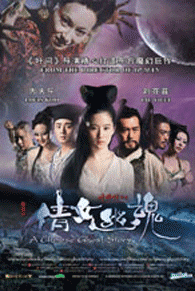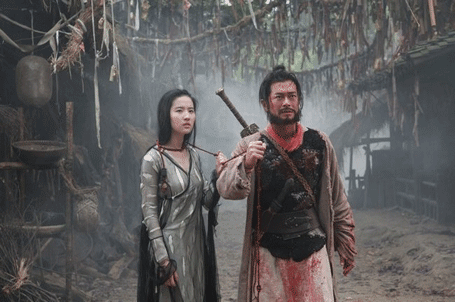
For those not in the know, the original A Chinese Ghost Story featured a simple but highly effective setup: impoverished and bumbling tax collector Ning (Leslie Cheung), goes to the haunted Lan Ruo Temple to stay for a night, where he meets siren Xiaoqian (Joey Wong), who lures men to have their essences sucked out by an old tree spirit called Granny (played by actor Lau Siu Ming in drag) to which she is captive to. Taoist priest Yan Chi-Hsia (Wu Ma) who has been watching on the sidelines all this while while warning Ning that “this ain’t natural sex”, finds himself joining Ning to storm hell in order to save Xiaoqian and ensure her a proper reincarnation.
The remake of the film, alas, adds a few mere details in the setup. That it adds more details when retelling the story is not the problem. It’s the kind of details that are added and how they change the overall effect - and not for the better.
Here, the result ruins the emotional hook of the original boy-meets-ghoul romance. For one thing, it switches the focus onto the Priest (here played by Louis Koo) instead, and reveals that many years ago he was a previous lover of the siren. The siren (Liu Yifei), on the other hand, is no longer a woman who died without a proper burial and therefore whose spirit was cursed to wander the Earth, but an out-and-out fox spirit (who has an avatar in animal form, much as this doesn’t make any sense) that wanders the temple. Ning (Yu Shaoqun) is not a bumbling tax collector who is despised by the townspeople simply for his vocation, but a civil servant and apparently some kind of skilled and well-equipped geologist. It even forsakes the tradition of having the Tree Demon being played by a man in drag. Kara Hui is the new Tree Demon, seemingly ugly only because she scowls a lot in pancake makeup.
The final effect is like watching Disney’s The Little Mermaid if the sea witch was presented as a beautiful woman (rather than as originally done, physically modeled on drag artist Divine.)
These few changes drastically upset the successful original formula and create a product with far less dramatic tension and contrast: it makes Ning too intelligent and too capable, takes away the eccentricity of Yan, and the emphasis of Xiaoqian as an actual demon rather than a former human being actually dampens the original’s message by affirming, rather than refuting, the message that “this ain’t natural sex”, and clutters up the film with noisy and unnecessary action. The end result is a film whose elements are out of balance and doesn’t seem to know what it wants or what kind of story it’s actually telling.
This remake of A Chinese Ghost Story is trite, forgettable and tedious. Ten years from now, it will still be the original trilogy, with its perfect balance of elements and superior storytelling, that people will rent.

